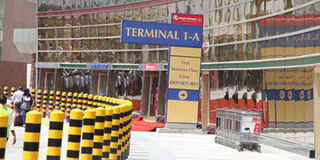Interior CS Nkaissery dismisses terror alert as 'hot air'

Jomo Kenyatta International Airport Terminal 1-A. Kenya's airports have been put under tight security following reports that Al-Shabaab terrorists are planning attacks. FILE PHOTO | NATION MEDIA GROUP
What you need to know:
Interior Cabinet Secretary Joseph Nkaissery dismissed the terror alerts as “hot air”.
Kenya is a regional air transport hub, with Moi and Jomo Kenyatta International airports handling the bulk of international connections.
KAA acting MD Yatich Kangugo said the authority was taking “proactive action on any intelligence information, however frivolous it may seem”.
Major airports were Monday under tight security following intelligence that Al-Shabaab was planning attacks.
The mounting threat had been discussed at various high-level meetings over the past few days, airport security and management teams confirmed.
Intelligence showed 11 suicide bombers had been trained by the terror group to carry out the offensive, which would have far-reaching implications on Kenya’s domestic and international air travel.
However, even as security officials confirmed heightened security measures, Interior Cabinet Secretary Joseph Nkaissery dismissed the terror alerts as “hot air”.
If there was any danger at JKIA, he told the Nation by phone, he would have visited the airport.
“The IG would have told me,” he said. “Obviously, you would have seen me and the IG at the airport. This was just hot air.”
Kenya is a regional air transport hub, with Moi and Jomo Kenyatta International airports handling the bulk of international connections.
The country’s airports handled 8.8 million passengers last year.
The increased surveillance within airport installations came just a day after President Kenyatta urged a reorganisation of the African Union Mission in Somalia (Amisom) troops to secure Kenya’s interests in the wake of a growing insurgency by Al-Shabaab, both locally and in Somalia.
He pointed out that the Gedo region posed a major threat to Kenya’s security.
“As a matter of urgency, Amisom must quickly deploy troops in Gedo region in Sector 3,” he said during an Amisom summit in Djibouti.
Part of the Kenyan contingent of Amisom remains at El-Adde, which was recently attacked by Al-Shabaab.
Defence CS Raychelle Omamo, also speaking in Djibouti on Sunday, said defence and foreign affairs ministers of the concerned countries were asked to accelerate the process of engaging the UN Security Council regarding the financing of Amisom.
She said Amisom was fighting terrorism in Somalia on behalf of the international community, and hence the need for the UN to fully fund its operations.
LEAKED MEMO
The new measures to secure Kenya’s airports include a bigger security presence in all the major facilities, tougher scanning of luggage and check-in controls for passengers, and increased surveillance operations in and around the facilities.
Kenya Airports Authority acting MD Yatich Kangugo said the authority was taking “proactive action on any intelligence information, however frivolous it may seem”.
Earlier, a leaked internal memo, purportedly from the airports security manager, Mr Eric Kiraithe, to all managers, and dated February 26, asked all security agents to be on high alert as “a team of 11 suicide bombers had undergone training within Somalia on airborne suicide missions” in readiness for the attacks.
The memo specified that the attackers were likely to target local flights, particularly at JKIA and Moi, but Mr Kangugo said the alert had been issued prematurely.
“The information was released without awaiting the due verification by threat assessment experts from the National Aviation Security Committee and other security agencies,” he said.
Although he did not divulge how the information was released to the public, he said action had already been taken against certain individuals within the authority.
But, even as he admitted that the danger of a terror attack was real, Mr Kangugo played down the possibility of such an attack happening at the country’s airports, saying scanners would pick out the smallest bit of explosive material.
All vehicles entering the airport are checked at the entry screening yards. Passengers are then checked using walk-through body scanners as their luggage is also passed through X-ray machines at the entrances to the terminals.





